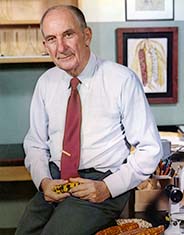Marcus C.M. Rhoades
* Deceased
Distinguished Professor of Genetics (Emeritus) - 1967

Marcus Rhoades was born in Graham, Missouri. He earned a B.S. in 1927, and an M.S. in 1928 from the University of Michigan. He continued his graduate work at Cornell University, specializing in corn genetics, and earned a Ph.D. degree in 1932.
After finishing his degree, Dr. Rhoades remained at Cornell as an experimentalist in plant breeding until he was hired by the United States Department of Agriculture, in 1935. He worked at Arlington Experimental Farm (now the Pentagon) for three years. In 1940, he joined Columbia University as an Associate Professor and was promoted to full Professor in 1943. Rhoades then moved to the University of Illinois where he became a Professor of Botany in 1948. In 1958, Rhoades moved to Indiana University where he was appointed the Chairman of the Botany Department. By 1968, Rhoades relinquished his Botany Chairmanship, and was named Distinguished Professor, and then Distinguished Professor Emeritus in 1974.
Dr. Rhoades is one of the world's leading cytogeneticits. His research has dealt with recombination, mutation including action of transposable elements, cytoplasmic inheritance, genetic control of meiosis, structural aberrations and preferential segregation of chromosomes, and the roles of chromosomal knobs and heterochromatin. His most notable contribution was the study of the Dotted gene, sometimes regarded as a precursor of the work on transposable controlling elements. He has published more than 70 articles on his research in refereed journals, and over 170 research reports in the Maize Genetics Cooperation News Letter.
Dr. Rhoades served on numerous local, national, and international committees throughout his career. Locally, he was a member of the Indiana University Athletic Committee, and held several offices in professional societies. He also served on the Selection Committee for Guggenheim Fellowships.
Among his many awards, Dr. Rhoades was one of the few scientists who have been elected into the National Academy of Sciences, as well as to both the American Academy of Arts and Sciences and the American Philosophical Society. In 1977, he was also made a Foreign Fellow of the Royal Danish Academy of Sciences and Letters. He, along with Barbara McClintock, was the first recipient of the Thomas Hunt Morgan Medal awarded by the Genetics Society of America, in 1981. He was also awarded an honorary D.S. degree from IU in 1982.

